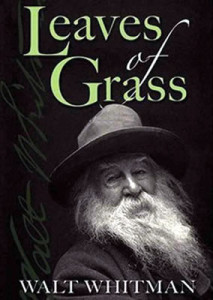Title: Leaves of Grass
Author: Walt Whitman
Type: Poetry
Page Count/Review Word Count: 478
Rating: 3/10
Well, where do I begin? I had high hopes for Leaves of Grass - Whitman dedicated most of his life to writing it, and it’s a key influence for some of the more contemporary poets that I read. I wasn’t expecting anything amazing, I thought it might be like The Collected Works of William Carlos Williams. I wasn’t expecting this.
Leaves of Grass is one of less than half a dozen books that it’s taken me over six months to read - for the curious, the others are The Two Towers, The Return of the King, The Oxford English Dictionary and The Letters of Allen Ginsberg. I was carrying it around with me for so long that I left a copy on the train and had to buy another one. In the end, I gave up and read it in short chunks, one twenty minute session every week or so.
It’s not even that it was long - it was long and unpleasant, and a huge disappointment considering all of the praise it’s received over the years. First published in 1855, when Whitman was in his late thirties, the poet spent the rest of his life revising and adding to it - the final version, dubbed ‘the deathbed edition‘, was released 36 years later in 1891.
Now, I’m not saying that Whitman is a terrible poet - after all, I’m not exactly qualified to challenge him. Having said that, calling Whitman a bad poet is like calling Justin Bieber a bad musician - it’s all matter of taste. I’d rather listen to Bieber albums back-to-back for a day than re-read Leaves of Grass, though.
Quite frankly, I can’t help but feel worried about the whole thing - is this being used in English lessons across the States? Is this a whole generation’s first exposure to poetry? If so, I can start to understand why nobody really cares about poetry anymore - if this was my first exposure to the great art then I doubt I’d have bothered to dig deeper and uncover Charles Bukowski or Allen Ginsberg.
That’s not to say that Leaves of Grass doesn’t have its place in the annuls of literary history, it’s just that there are more accessible works out there, other books that you’ll actually enjoy reading. I’m not ashamed of the fact that I read for pleasure - why should I be? All good art forms are created and regarded for the joy of creation and regarding, so why should Leaves of Grass be any different, just because ‘it’s a classic’?
Overall, Leaves of Grass is best left to academics and lovers of traditional poetry who don’t mind spending evening after evening feeling dull and uninspired as they tediously turn over the pages and wander closer to the end. Have fun with that.
Click here to buy Leaves of Grass.





































